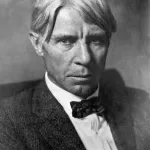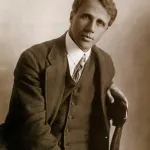So I’m an alcoholic Catholic mother-lover
yet there is no sweetish nectar no fuzzed-peach
thing no song sing but in the word
to which I’m starlessly unreachably faithful
you, pedant & you, politically righteous & you, alive
you think you can peel my sober word apart from my drunken word
my Buddhist word apart from my white sugar Thérèse word my
word to comrade from my word to my mother
but all my words are one word my lives one
my last to first wound round in finally fiberless crystalline skein
I began as a drunkard & ended as a child
I began as an ordinary cruel lover & ended as a boy who
read radiant newsprint
I began physically embarrassing — “bloated” — &
ended as a perfect black-haired laddy
I began unnaturally subservient to my mother &
ended in the crib of her goldenness
I began in a fatal hemorrhage & ended in a
tiny love’s body perfect smallest one
But I began in a word & I ended in a word &
I know that word better
Than any knows me or knows that word,
probably, but I only asked to know it —
That word is the word when I say me bloated
& when I say me manly it’s
The word that word I write perfectly lovingly
one & one after the other one
But you — you can only take it when it’s that one & not
some other one
Or you say “he lost it” as if I (I so nothinged) could ever
lose the word
But when there’s only one word — when
you know them, the words —
The words are all only one word the perfect
word —
My body my alcohol my pain my death are only
the perfect word as I
Tell it to you, poor sweet categorizers
Listen
Every me I was & wrote
were only & all (gently)
That one perfect word
- In video footage of Alice Notley reading this poem at The Poetry Project at St Marks Church in the Bowery in New York City in the early 80s (an outtake from Canadian director Ron Mann’s fantastic documentary Poetry in Motion; a clip below is available on Youtube), the poet explains before reading the poem, “The Jack is Jack Kerouac and the Alice is Alice Notley.” How does knowing that this poem is about the writer Jack Kerouac, credited with coining the term “Beat generation,” change the meaning of the poem for you as a reader?
- How does the poet challenge popular attitudes about Jack Kerouac as a literary icon?
- How does the poet represent time in an unusual way?
- How does the speaker in the poem feel about Jack Kerouac?
- If you were doing to recite this poem, what tone would you use? Would it shift throughout the poem? Where?
- In writing this poem, Alice Notley takes on the voice of Jack Kerouac and imagines how he would talk back to his fans and detractors. Think about someone you admire who is no longer alive and write a poem in his or her voice. For a more detailed version of this exercise, click here.
HELPFUL LINKS
- Watch Alice Notley read this poem at The Poetry Project at St Marks on the Lower East Side of Manhattan.
- The Poetry Project in New York continues to be a poetry community hub, and they still hold 24-hour marathon poetry readings every New Year’s Day. Their site is here: http://www.poetryproject.org/
- Alice Notley is now recognized as one of the best poets of her generation and has won many major awards for her work. See her read from her Griffin Poetry Prize–winning book, Disobedience: http://www.griffinpoetryprize.com/see-and-hear-poetry/h-n/alice-notley/
- Alice Notley 101: https://www.poetryfoundation.org/articles/70225/alice-notley-101
- A long interview with Alice Notley by Creative Director Alice Notley: https://damianrogers.wordpress.com/2010/01/28/interview-with-alice-notley-part-one/
“Jack Would Speak Through the lmperfect Medium of Alice” by Alice Notley from Grave of Light: New and Selected Poems, 1970–2005 (Wesleyan University Press 2006). © 2006 by Alice Notley and reprinted by permission of Wesleyan University Press.





